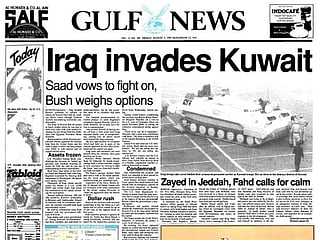Will corruption ever cease to exist in Kuwait?
Nobody doubts the Prime Minister’s integrity, but more needs to be done, says Al Jarallah

Also In This Package
Abu Dhabi: Kuwait’s corruption is of a magnitude that simply cannot be ignored and run by a type of criminal described by veteran journalist Ahmed Al Jarallah, editor of Aseyassah newspapaer, as a Crime Lord who goes by the local nickname ‘Al Khamoush’.
Al Jarallah says no one in Kuwait doubts or questions His Highness the Prime Minister Sheikh Sabah Al Khaled’s integrity, nor his good intentions to fight corruption, and that he is diligent, however diligence does not always achieve its goals.
“The question that occupies the majority of Kuwaitis is: Can this government, whose term of office ends in a few months, really address all the issues presented to it, and remove the accumulation of about 50 years of rampant corruption across the country, and more importantly, can it eliminate ‘legalised’ corruption?,” asks Al Jarallah.
“We all in Kuwait know the weaknesses in the structure of combating this deadly scourge, and how it works, and although we have heard for some time that the law will be enforced with full force, no one is above the law, and justice will take its course, but we have never seen any ruling on a corrupt, or thwarting the schemes of those who loot public money and undermine institutions,” he adds.
Media excitement
“Rather, what is more important is that a graft scandal begins with media excitement, and a lot of talk about it. But suddenly another scandal surfaces and we forgot about the first, and a while later a third scandal eliminates what preceded it, and so on for half a century,” he continues.
Al Jarallah argues there is no doubt that this is due to the Kuwaitis’ convictions: “First, Kuwait is blessed, and God willing it will remain so; second, time heals all wounds. Let me tell you, time heals nothing; and third and most important is the so-called ‘Al Khamoush’, a type of super criminal who works quietly behind the scenes. The Crime Lord engineers his schemes at night, and the schemes abound in huge projects. For instance, the government invites bids for a billion dinar project that must be submitted within a finite deadline. Before small bidders submit their bids, the Crime Lord reaches a deal with them to overprice the project to say 1.7 billion dinars against 200 million dinars in kickback money to them. Then the Super Criminal submits his winner bid of 1.5 billion dinar,” Al Jarallah says.
Corrupt officials
He confirms this corruption does not stop there, as “Al Khamoush works to beef up profits through what is known as change orders, which make the cost reach two billion dinars, and the project may not be completed in 10 years, because it is transformed into a milky cow. This is one of the types of legal corruption, Mr. Prime Minister. Of course, you will not be able to eliminate this phenomenon because the 'Khamoush' is stronger than the governments as long as corrupt officials receive kickback money from unscrupulous businessmen,” he explains.
Al Jarallah asks if the government seriously plans to eliminate this type of corruption? “Are the 1Malaysia Development Berhad, the Balgladeshi MP graft scandals, the residency visa scam and the bust of a money laundering gang all smoke bombs to cover up other corruption files?”
He continues, “Kuwaitis are well aware that this method is just pain relief, so they expect the impact will invariably been limited, with campaigns against graft scraping only the surface and being abandoned after a short period when a few big fish have been held up to public scrutiny and the immediate political aim has been achieved. All these facts are before you, Mr. Prim Minister, and they were present at the table of the previous cabinets, but there was no action, because corruption bares its teeth. Finally, may God assist you, Your Highness, the Prime Minister, liquidate it, while the ‘Khamoush’ works with full force, not only in tenders, but also in forming governments, in elections, and in post nominations, and everyone in the country seeks to identify who has the upper hand in everything,” Al Jarallah concludes.








